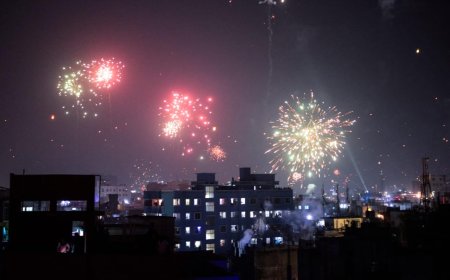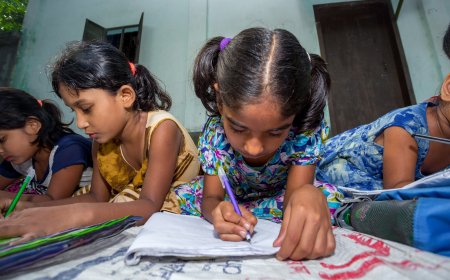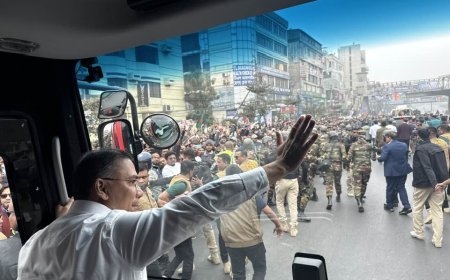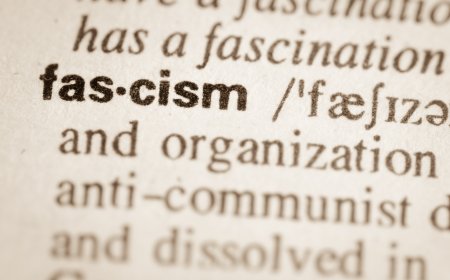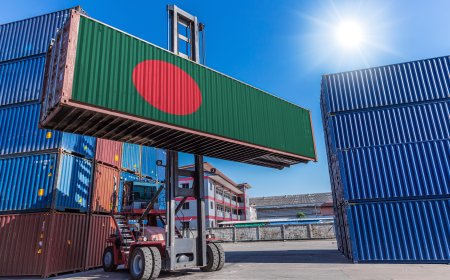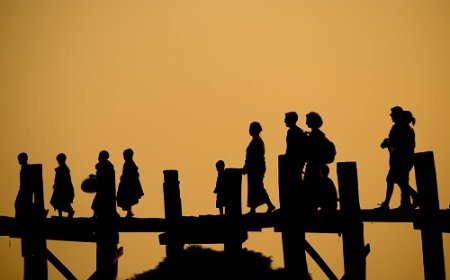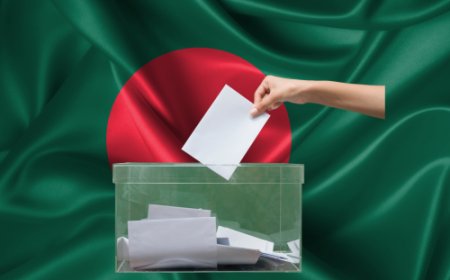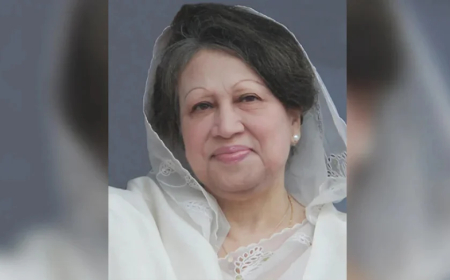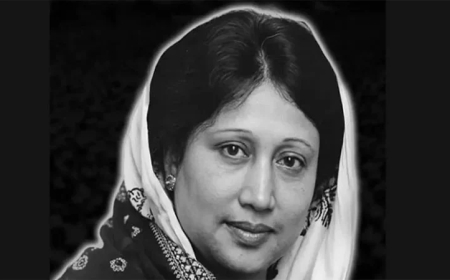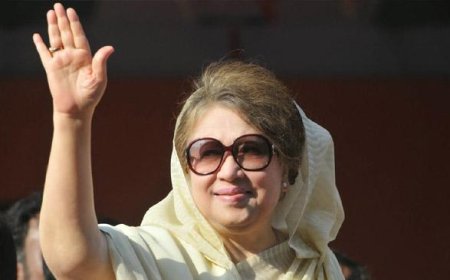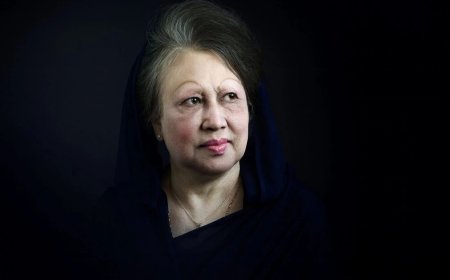Forget the Elite. We Need To Think About Aspiring Elites.
What happens when the interests of the elite class collide with those of an ever more assertive aspiring elite? We're about to find out.

At the end of the day, development will result from the efforts of people across the board -- from small farmers and informal sector workers to large NGOs and conglomerates. These economic actors will contribute through their creativity, entrepreneurship, hard work and resilience. But they need a conducive environment -- the mix of policies, laws, regulations and institutions that foster entrepreneurship and trigger creativity. Who will drive the processes that would help create such an environment?
It is widely believed that over the past few decades, the elite of Bangladesh, concerned about widespread poverty and vulnerability, was able to forge a consensus around a critical set of policies, reforms, institutions and programs that drove growth and development. It didn’t happen overnight, and it was not always very smooth. But it was enough to help mobilize the minimum amount of ingredients needed to put Bangladesh on the path of development.
Recently, Naomi Hossain, who once authored a book on elite perceptions of poverty in Bangladesh, wrote a piece in Counterpoint where she reminded us of this elite consensus. She referred to the literature and cited economists such as Stefan Dercon of Oxford University who have written on the subject. In a recent book, Dercon has cited Bangladesh as a good case of elite consensus for development.
Having described the contours of such elite consensus in Bangladesh, Naomi Hossain then wonders whether, in the coming years and decades as we try to address the emerging development challenges of the country, the Bangladeshi elite would once again be able to forge the required consensus. She is not sure. Towards the end of her article, Naomi Hossain expresses a certain degree of skepticism. The elite may not deliver, she fears. I share her skepticism.
I believe that the elite of the country, whether political, intellectual, business or bureaucratic, may have entered a stage in their lives where they have become used to an easy life of luxury and privileges, or trapped in their old, deeply entrenched ways of thinking. Some have become irremediably corrupt. Given this, they may not be able to harness the energy and creative thinking needed to forge a developmental consensus and trigger visionary policies and tough decisions.
So, does this mean that we are unlikely to see a renewed path of development in the country? Not necessarily.
I am suggesting that a consensus or drive may still come, but not from the established, lethargic, and in some cases corrupt, elite class. Instead, it may come from another class, which I term the "aspiring elite."
In an article published in Dhaka Tribune last year, I defined such a class. These are people in various tracks, such as politicians, businesspeople, intellectuals and bureaucrats (both civil and military), who are not elites but, having progressed over time, have come to a point where they believe that they can also be part of the elite. In other words, they are knocking on the door of the elite class.
Examples would include a medium-scale businessperson who wants to become a large industrialist, or an associate professor who now dreams of becoming a faculty dean, a joint secretary who hopes to be a senior secretary, a colonel whose target now is to become a general, or the district-level president of a party who aspires to get a seat in the parliament. The aspirations vary depending on the circumstances of the people. But there is a common element in all of them. The aspiring elite are dynamic, aggressive, and pushy, much more than the established elite.
The pursuit of their aspirations may not necessarily induce the aspiring elite to think about the broader development goals of the country. In the first round, they will be busy pursuing their own dreams. They will try to get access to resources, including resources provided by the government, and extract various privileges so that they can move up the rungs. However, a time may come when they realize that without certain policies, programs and reforms, in brief without a strong development orientation in government, their aspirations may remain unfulfilled.
The aspiring elites may then form coalitions with other members of the aspiring elite class to push these actions. This may help them move up and gain membership of the elite club. But more importantly, under certain circumstances, this may also lead to broader development and enhanced welfare for the people. Before discussing how this may happen let us further explore the class of economic actors who aspire to elite status.
Let us start with medium-scale industrialists in secondary cities such as Bogra, Khulna or Sylhet whose dream is to set up large factories, preferably in an export-oriented activity. Some may want to move to Gazipur or Savar. Some may want a conducive environment near their hometown. They would need greater access to resources, such as credit and serviced land, and facilities, such as logistical and quality assurance services required to enter export markets. They would demand a more conducive regulatory environment and perhaps some tax breaks.
We may also think of emerging economic actors in villages. We know that the paradigm is shifting in rural Bangladesh. We know of a new generation of young farmers who are going into all kinds of non-traditional agricultural activities, including exotic crops, from dragon fruits to avocados, from sunflowers to strawberries. Many are into poultry, fisheries, and cattle-rearing. Others are trying their luck with small foundries that make agricultural tools and spare parts.
Ongoing research at the Bangladesh Institute of Development Studies (led by Professors Sattar Mandal and Geof Wood) points to yet another new development, i.e. the leasing in of farmland by service providers. Farmers in some regions are leasing out their lands not to other farmers as they had traditionally done but to those who had been supplying various agricultural inputs, including agricultural machinery. These processes often involve the consolidation of operational holdings since the cash-rich service providers are leasing in land from several farmers who own adjacent plots. This raises the prospect of more commercial farming by the service providers, unencumbered by fragmented holdings.
We can think of this emerging class of service providers cum nouveau farmers, as well as the young farmers and entrepreneurs we mentioned earlier, as rural-based aspiring elites. Often bolstered by remittance income, these aspiring elites may demand public investments of various kinds, such as better road connectivity, public storages and market infrastructure, as well as credit facilities and better policies and regulations.
The young tech-savvy entrepreneurs in large cities such as Dhaka could be our fourth example of aspiring elites. We may envision a scenario where a large group of young entrepreneurs want to move beyond the start-ups they are now trying to establish and set up companies that hire hundreds of skilled engineers, technicians and other workers to make parts for laptops and automobiles, design chips, or assemble and test integrated circuits. In brief, they are ready to help transform Bangladesh’s manufacturing and export sectors and move these towards a new future characterized by more diversified and sophisticated exports, and a competitive strength based on skills and knowledge, not cheap labor.
Such a class of entrepreneurs will also need a conducive environment such as public investment in quality education that produces the skilled workforce they need, streamlined import and export processes, serviced industrial land or plug and play office spaces.
As these groups lobby for the public investments and other support they need, they may discover that some of the hurdles they face are due to the actions of the elite class. Let me provide some examples.
As suggested above, fulfilling the needs of the aspiring elites will often require expanded government spending. For example, the government may need to build economic zones near Gazipur, Narayanganj, or the secondary cities, to accommodate the ambitious mid-sized industrialists who need serviced industrial land to fulfill their ambitions.
Public investments need to be funded by tax revenues. If revenues don’t increase in tandem with growing expenditures, fiscal deficits are generated which are covered by government borrowing. This, in turn, increases government debt and, thereby, also interest payments. Such developments often put a brake on government expenditures. This is exactly what is now happening in Bangladesh. A major reason for the failure to adequately raise tax revenues is the elite’s opposition to raising more taxes, or even the collection of existing ones.
Let us consider another example. Like other industrialists, the aspiring elites in this class need adequate capital machinery and raw materials. It is now widely recognized that a major cause of the recent depletion of foreign exchange reserves is capital flight, largely the doing of a section of the elite class. This depletion of reserves, although now arrested, has led to policies that have seriously curtailed imports of raw materials and capital goods.
There has not been any serious study of the incidence of the import restrictions, but it is likely that a large section of the aspiring elites has been impacted. Small factory owners whose businesses were expanding, raising their hopes of graduating to the elite status of a large industrialist, may now see their ambitions frustrated, and in some cases even their survival threatened by the import restrictions. These are just two examples of how the interests of the elite and the aspiring elite are colliding. Surely there are more such examples.
Let us now move from economics to politics. This is where the other parts of the aspiring elite classes come in.
Think of mayors in a secondary city where a critical mass of medium-scale industrialists has started harboring the kind of dreams I mentioned above. The industrialists go to the mayors asking for support to get the resources and the conducive policy and regulatory environment they need to fulfill their aspirations. The mayors decide to respond for both altruistic reasons -- help build industry and create jobs in their areas -- and for fulfilling their own political ambitions. They know that a good performance may bolster their chances of moving up the political ladder. After all, they too are aspiring elites!
Meanwhile, in rural Bangladesh, ambitious local level politicians may start working with the emerging class of young entrepreneurial farmers and the service providers cum nouveau farmers to advance their interests. They may lobby the district level bureaucrats for support, and if this is not sufficient may approach national-level politicians in the capital city for help. Senior bureaucrats may be approached and asked to take necessary initiatives to help these emerging economic actors in rural areas.
Through processes such as these, a virtuous nexus may emerge where aspiring elites in different tracks -- business, politics and bureaucracy -- work collaboratively to make things happen in a way that development goals are achieved. There is, of course, a danger that the nexus becomes a vicious one where people collude to extract privileges from the system rather than help create the conditions for development. It then becomes an "aspiring" elite consensus for rent-seeking, and not for development. How can we avoid such a perverse outcome?
This brings us to the watchdogs of society, the intellectuals and the media. There are aspiring elites in these groups too. They can do a service by working differently from the established elites in these tracks. Instead of repeating the same cliches and going for headline-grabbing statements, the intellectuals may bring fresh approaches to research and discourse, grounded in the new reality, and guided by stronger integrity. They would tell the stories of the new breed of entrepreneurs, identify the bottlenecks they are facing and carry out advocacy for policies and programs that remove these bottlenecks. In doing so, they should try to ensure that the emerging consensus among the aspiring elites does not degenerate into a privilege-seeking collusion.
Their voices would be amplified by the aspiring elites in the media world. Instead of becoming influence-brokers like the media elite, the aspiring elites in the media world may work to discipline the emerging coalitions that I discussed above and ensure that they are not seduced by the attractions of large-scale rent-seeking.
Finally, the relation between government and business may need to be redefined. The interface between government and businesses is a vital dimension of economic management. It has important implications for the performance of the business sector and economy more broadly. We can think of at least three interfaces to work on: a) the regulatory interface, where we need to move from case-by-case reforms to a more strategic reform approach; b) the provision of incentives to the private sector, where we need to introduce strict performance disciplines, i.e. linking support to attainment of pre-defined results; and c) enhancing competition in the marketplace, which requires a better understanding in government of market dynamics and creative ways of steering markets.
In the coming years, as the global economy becomes more volatile, it will generate both opportunities and risks. How well we grab the opportunities and manage the risks will depend a lot on the quality of the government-business interface.
It can’t be business as usual. The time has come to rethink this relationship. This is important if we want to ensure that the new consensus that we talked about, i.e. between the aspiring elites, becomes one for development and not seeking rents.
In this piece, I have just scratched the surface of this promising area of inquiry. Hopefully, others will join the discussion, elaborating or disagreeing with what I have said here.
What's Your Reaction?








